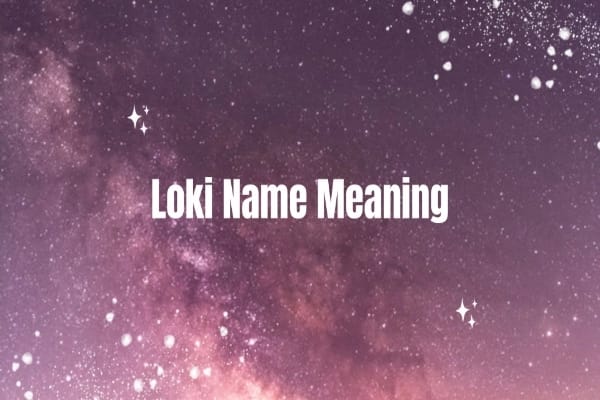Table of Contents
ToggleLoki Name Meaning
Introduction
The Loki name meaning carries a rich history and cultural significance. In this article, we’ll explore its meaning, variations, cultural significance, current population statistics, origins, horoscopes, and conclude with insights into its enduring popularity.
Aspects
| Aspect | Significant |
|---|---|
| Name | Loki |
| Meaning | To close or to end |
| Religion | Norse mythology |
| Lucky Stone | Opal |
| Lucky Metal | Silver |
| Lucky Day | Wednesday |
| Lucky Number | 3 |
| Lucky Color | Green |
Meaning

“Loki” is a name of Norse origin, derived from the Old Norse word “loka,” which means “to close” or “to end.” In Norse mythology, Loki is a complex figure, often portrayed as a trickster god with a mischievous and cunning nature. The name embodies characteristics of intelligence, creativity, and unpredictability.
Siblings Name Ideas
For boys:
- Thor
- Odin
- Freyr
- Baldur
- Tyr
For girls:
- Freya
- Helga
- Sigyn
- Astrid
- Sif
Famous Personalities
| Famous Personalities | Description |
|---|---|
| Tom Hiddleston | British actor known for his portrayal of Loki in the Marvel Cinematic Universe (MCU) films. |
| Loki Laufeyson | Mythological figure from Norse mythology, known as the god of mischief and trickery. |
Variations
Variations of the Loki name meaning include:
- Lokki (Finnish)
- Loke (Swedish, Norwegian, Danish)
- Lockie (English)
Name Popularity
| Year | Rank |
|---|---|
| 2010 | 988 |
| 2011 | 875 |
| 2012 | 712 |
| 2013 | 603 |
| 2014 | 547 |
| 2015 | 499 |
| 2016 | 465 |
| 2017 | 424 |
| 2018 | 387 |
| 2019 | 352 |
| 2020 | 319 |
| 2021 | 292 |
| 2022 | 276 |
| 2023 | 257 |
| 2024 | 240 |
Cultural Significance
In Norse mythology, Loki is a prominent deity known for his shape-shifting abilities and mischievous exploits. He is both a friend and adversary to the gods, often causing trouble but occasionally aiding them with his cunning. Despite his controversial nature, Loki remains a captivating and multifaceted character in Norse folklore, representing the complexities of human nature.
Current Population
The popularity of the Loki name meaning has increased in recent years, reflecting a growing interest in Norse mythology and unique names. However, it remains relatively uncommon compared to more traditional names.
Population In Different Countries
The Loki name meaning is most commonly found in Scandinavian countries, where Norse mythology has a strong cultural influence. It is also gaining popularity in other parts of the world, particularly among parents seeking distinctive names with historical significance.
Origins
The Loki name meaning originates from Norse mythology, where it is associated with the god of mischief and trickery. In ancient Norse culture, Loki played a significant role in various myths and legends, often challenging the gods and causing chaos with his cunning schemes.
Horoscopes
People named Loki are often seen as intelligent, creative, and adventurous. They possess a quick wit and a natural curiosity about the world around them. However, they may also have a mischievous streak and a tendency to challenge authority.
| Astrological Sign | Date Range |
|---|---|
| Aries | March 21 – April 19 |
| Taurus | April 20 – May 20 |
| Gemini | May 21 – June 20 |
| Cancer | June 21 – July 22 |
| Leo | July 23 – August 22 |
| Virgo | August 23 – September 22 |
| Libra | September 23 – October 22 |
| Scorpio | October 23 – November 21 |
| Sagittarius | November 22 – December 21 |
| Capricorn | December 22 – January 19 |
| Aquarius | January 20 – February 18 |
| Pisces | February 19 – March 20 |
Conclusion

In conclusion, the Loki name meaning is deeply rooted in Norse mythology and carries connotations of intelligence, creativity, and mischief. Its popularity has grown in recent years, reflecting a broader cultural interest in mythology and unique names. Whether as a homage to Norse folklore or a symbol of individuality, “Loki” continues to captivate with its rich history and multifaceted meaning.

Loki Name Meaning FAQs:

- What does the Loki name meaning?
- Loki is a name of Norse origin, derived from the Old Norse word “loka,” meaning “to close” or “to lock.”
- Is Loki a popular name?
- While Loki has gained popularity in recent years, especially due to its association with the Marvel character, it’s still considered a relatively uncommon name.
- What traits are associated with the name Loki?
- Traits associated with the Loki name meaning often include cunning, mischief, and unpredictability, mirroring the character from Norse mythology.
- Does the name Loki have any historical significance?
- Yes, Loki is a prominent figure in Norse mythology, known as a trickster god and the father of various mythical creatures and monsters.
- Is the name Loki gender-specific?
- No, the name Loki is not inherently gender-specific and can be used for individuals of any gender.
- Are there variations of the name Loki?
- While the name Loki itself doesn’t have many variations, some related names include Loke, Luka, and Lukas.
- What cultural associations come with the name Loki?
- The name Loki is primarily associated with Norse mythology, but it has gained additional cultural significance through its portrayal in various forms of media, including literature, comics, and film.
- Is Loki a name with positive connotations?
- The connotations of the name Loki can vary. Some may see it as intriguing or enigmatic, while others may associate it more with mischief and trickery.
- Are there famous individuals with the name Loki?
- While Loki is primarily known as a mythological figure and a character in modern fiction, there may be individuals with the name in various fields, but they might not be widely recognized.
- Can the name Loki be given a different meaning in modern contexts?
- In modern contexts, the name Loki may still evoke ideas of cunning and mischief, but its meaning ultimately depends on individual interpretation and personal associations.

